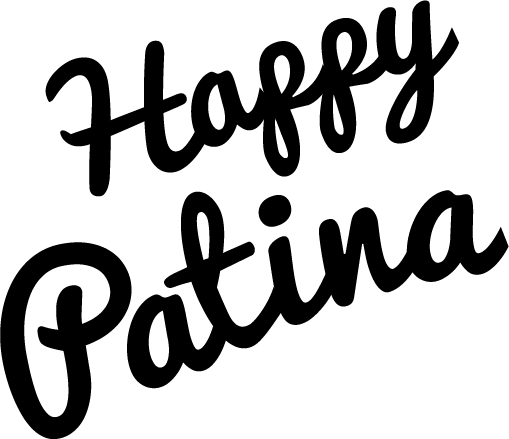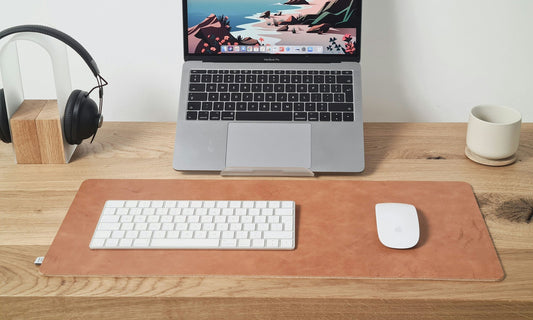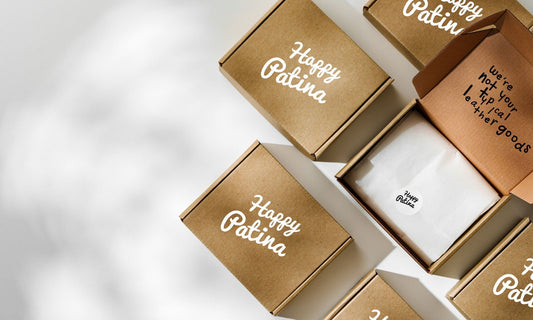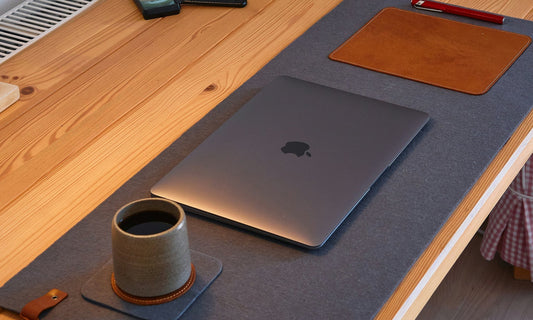
Why Fewer, Better Tools Make You More Productive
Oscar ArenasIn an age of constant stimulation, where multitasking is glorified and noise is mistaken for progress, it’s easy to forget that real productivity is quiet. It doesn’t come from doing more — it comes from doing better. And that begins with simplifying the tools we use every day.
At HappyPatina, we believe that a workspace should be built around focus, not clutter. That’s why our philosophy — and every product we design — revolves around one idea: fewer, better tools. Because when the objects around you are clear in purpose, your mind follows.
1. The Paradox of Modern Productivity
We live surrounded by tools — apps, devices, gadgets, planners, notebooks. They promise efficiency but often create the opposite. Each new system adds a layer of complexity; each notification steals a fragment of attention.
True productivity doesn’t thrive in abundance. It thrives in clarity. The fewer choices your environment demands, the more mental energy you have for meaningful work.
Minimalism isn’t about owning less — it’s about needing less.
When you reduce noise — visual, digital, or emotional — what remains is focus. And focus, more than any tool or technique, is the foundation of deep work.
2. The Psychology of Less
Our brains are not wired to process constant decisions. Every extra object, app, or reminder competes for attention, triggering what psychologists call decision fatigue. Even small distractions accumulate into mental clutter, reducing creativity and energy.
By curating your tools — keeping only what you truly need — you give yourself back space to think. Each item on your desk should earn its place. If it doesn’t serve your process or inspire calm, it’s taking more than it gives.
This is where craftsmanship becomes philosophy. A single, well-designed object can replace a dozen disposable ones — and in doing so, bring serenity to your surroundings.
When tools are few but chosen with care, work becomes ritual instead of chaos.
3. Essentials That Anchor Focus
Productivity begins with tactile clarity. The objects you touch daily — your notebook, your desk pad, your pen — shape the way your mind behaves. When they’re designed with intention, they become extensions of focus.
Here are a few workspace essentials that embody simplicity without compromise:
-
Desk Pad – Natural Leather
A natural boundary between chaos and calm. It defines your workspace, absorbs noise, and grounds your thoughts.
-
Writing Kit Cover – Natural Leather
A dedicated space for ideas — because when thoughts have a home, creativity flows freely.
-
Document Folio – Natural Leather
Order in motion. Keeps papers aligned and protected without disrupting your visual balance.
-
Valet Tray – Natural Leather
A small anchor of calm for keys, pens, and other essentials — proof that function can also be beautiful.
These pieces aren’t just tools; they’re a reminder that organization begins with respect for your environment.
4. The Cost of Too Many Choices
Abundance often leads to paralysis. When everything is possible, nothing feels essential. That’s why creatives, writers, and thinkers across centuries have all sought simplicity — not as a style, but as a survival strategy.
Einstein famously owned multiple identical suits to eliminate one daily decision. Writers clear their desks before starting a new project. Artisans keep only the tools they trust most. Simplicity sharpens the mind because it removes friction.
In a well-designed workspace, every item has a clear function and a clear reason to exist. That clarity frees your energy for the work that truly matters.
5. Fewer Tools, Deeper Connection
When your tools are few, you build relationships with them. You know their texture, their weight, their history. This connection is more than aesthetic — it creates emotional continuity in your work.
A leather folio that travels with you, a pen that’s been refilled a hundred times, a desk pad that shows the marks of your daily rituals — these are companions, not possessions. They remind you that progress isn’t measured in speed, but in depth.
In the end, productivity is not about output; it’s about presence.
6. Minimalism as a Creative Framework
Minimalism isn’t about deprivation. It’s about removing friction — giving your attention a clear path to flow. The fewer elements you have to manage, the easier it becomes to think freely.
At HappyPatina, we translate this philosophy into design: rounded edges for comfort, natural textures for warmth, and proportions that guide the eye without distraction. Each product invites stillness — the kind of stillness where ideas emerge naturally.
This is what we call functional serenity: the harmony between beauty and purpose.
- Fewer tools create rhythm.
- Rhythm creates flow.
- Flow creates mastery.
It’s not about doing less — it’s about removing what doesn’t belong, so what matters can shine.
7. The Discipline of Editing
Creativity and organization share the same rule: Edit relentlessly. Each day, take a moment to remove what doesn’t serve you — whether that’s an unused tool, a digital tab, or a lingering thought.
Editing your workspace sharpens your focus the same way editing a paragraph sharpens your writing. The more intentional your environment becomes, the more deliberate your mind becomes.
Ask yourself daily:
- Does this tool help me create?
- Do I use it, or just own it?
- If I removed it, would I miss it?
Your answers reveal the difference between clutter and craft.
8. Redefining Success Through Simplicity
We often equate productivity with busyness — the number of tasks completed or hours spent. But true success lies in the quality of attention you bring to your work. A calm environment produces deeper thought, better decisions, and more meaningful results.
The fewer distractions your workspace offers, the stronger your relationship with your craft becomes. That’s why minimalism isn’t a trend; it’s a discipline — one that transforms effort into art.
Minimalism is clarity disguised as simplicity.
9. A Workspace That Breathes
When every tool has purpose, space becomes an ally. Empty surfaces aren’t wasted — they’re invitations to think, to reset, to breathe. In a world full of noise, a quiet desk is a luxury.
Leather, wood, and paper create a sensorial rhythm that digital tools can’t replicate. They reconnect you with the physical act of creation — something slow, deliberate, and human.
That’s the environment where true productivity happens: one defined not by excess, but by essence.
Key Takeaways
- Productivity thrives on clarity, not quantity.
- Minimalism reduces friction and enhances focus.
- Fewer, better tools lead to deeper connection and higher quality work.
- Design simplicity creates emotional and creative balance.
- In a world of noise, calm is the ultimate luxury.
FAQs
How can I start simplifying my workspace?
Remove everything from your desk, then reintroduce only the items you use daily. Invest in fewer but higher-quality tools — they’ll last longer and create visual harmony.
Is minimalism practical for creative work?
Absolutely. Minimalism supports creativity by removing distractions and focusing energy. When your tools are simple, your ideas become clearer.
What are the essentials for a productive minimalist desk?
A clean surface, a natural leather desk pad, one or two writing tools, and a place for organization — like a tray or folio. Everything else should serve a purpose or be removed.
Explore More Guides
- Every Object Has a Place — The Art of Quiet Organization
- The Timeless Desk — How to Build a Workspace That Inspires You
- A Life Well Crafted — The Philosophy Behind HappyPatina
Final Thoughts
Fewer tools. Better tools. A clearer mind.
The art of productivity isn’t about acceleration — it’s about alignment. When your environment supports your rhythm, work becomes effortless. When your tools are chosen with purpose, every action gains meaning.
At HappyPatina, we design for this kind of productivity — the quiet kind. Where design isn’t decoration, but discipline. Where focus comes naturally, and beauty follows function.
Explore the Office Collection →



